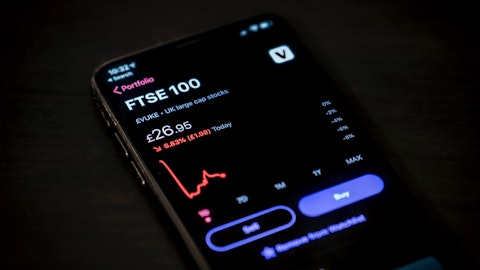Harlan Weisman : Justin, thank you for the question. And again, Zamaneh, that seems that you’re best positioned to answer that.
Zamaneh Mikhak: Sure. With respect to safety and tolerability, there are certainly certain adverse events that are very common when you use oral or intravenous voriconazole. Then three top reasons for discontinuing voriconazole is hepatic toxicity. Liver function tests go up 3,4,5 times the upper limit of normal and at some point, physicians decide whether your patient has signs and symptoms of hepatic toxicity, this is getting too uncomfortable and they stop oral or intravenous voriconazole. Visual disturbances are quite uncomfortable for patients. It’s a very common reason for discontinuing treatment. Rashes are very common. So we will certainly — we are suddenly looking for all of these types of adverse events and following those and we expected to certainly report on adverse events in a comparative way compared with the historical data.
With respect to what types of signs and symptoms might be common to or might happen with inhaled therapy, certainly with any type of inhaled therapy, you look for evidence of bronchospasm or uncontrollable costs or things of the sort and certainly we follow those and we also plan to report on those in the upcoming data release. We will report what we have, we will report the data and that’s available to us by the end of this year, and share that both in terms of safety tolerability and efficacy. It will be in a subset of patients. And as I mentioned, patients will have been treated for varying amounts of times, we do believe what we present will be directionally informative, in the same way that there to compassionate use patients that we originally presented was very informative.
So we expect that will form the base of than the data, the more complete data set that will share by the end of first quarter 2024.
Justin Walsh : Great, thanks. And just one more for me, obviously, the big focus has been on, rightly so on TFF VORI and TFF TAC, but maybe just provide a quick commentary on some of the other work that you guys have been doing and maybe some other things that you might be excited about that possible applications of Thin Film Freezing that you’d like to highlight.
Harlan Weisman : Yes, so I’ll take that. While we’re continuing our collaborations with pharma and biotech companies. And we’ve been able to demonstrate that the technology has utility in creating dry powder formulations for a variety of molecules like monoclonal antibodies, vaccines, RNAs, other biologics as well as small molecules. As an example, last week, we announced the publication of results of our collaboration with Aptar Pharma, where we use the TFF process to convert a monoclonal antibody into an aerosol and [indiscernible] on dry powder that we can deliver into the posterior nasal cavity using the after those nasal spray systems. But, Justin it’s important to emphasize that it’s too early to say whether any of these collaborations will result in a meaningful business opportunity for the company and review all of them as the potential upside to the tremendous potential TFF VORI and TFF TAC.
Justin Walsh : Great, thanks for taking the questions.
Operator: Thank you. Your next question is from Daniel Carlson from Tailwinds. Please ask your question.
Daniel Carlson : Guys, thanks for taking my questions. Just, on VORI and TAC, cash is tight. At some point, if you had to make a choice between the programs, how would you decide which one to move forward on?
Harlan Weisman : Yes. Hi, Dan, and thanks for participating and asking your question. Well, of course, we’d like to go forward with both programs. But we’re going to let the data drive our decisions. We will have to consider the potential for each commercially, things like acute versus chronic treatment, the competitive environment, it also is going to depend on interactions with the FDA and our ability to raise appropriate funds for both programs.
Daniel Carlson : Got you. Okay. And then do you had an SBIR grant for, I think $3 million for a universal flu vaccine program. Can you talk about the status of that?
Harlan Weisman : Sure. This is a collaborative research program with the Cleveland Clinic, it’s well underway. Although the goal of the program is to develop an IND ready vaccine, that’s probably three years away. Initial work is focused on developing formulations. And once we’ve completed this formulation work, we’ll begin animal testing. It’s important to say that the program underscores the recognition of our technology with entities such as the NIH and our ability to create great like Thin Film Freezing formulations, which can be applied broadly including in this program for a universal off the shelf vaccine. And it’s also a perfect example of the potential for additional non-dilutive financing.
Daniel Carlson : Got you. Okay. Thanks, guys. Appreciate the update.
Harlan Weisman: Thank you. Thanks, Dan.
Operator: Thank you. There are no further questions at this time, I will now hand the call back to Harlan, for closing remarks.
Harlan Weisman : Well, once again, I appreciate all the participants in today’s call and hearing our update, particularly appreciate the support of our investors who have had faith in us and we’re looking-forward to presenting the initial data from our clinical programs at the end of the year. Thank you and good evening.
Operator: Thank you. Ladies and gentlemen, the conference has now ended. Thank you all for joining you may all disconnect.
Follow Tff Pharmaceuticals Inc. (NASDAQ:TFFP)
Follow Tff Pharmaceuticals Inc. (NASDAQ:TFFP)
Receive real-time insider trading and news alerts



